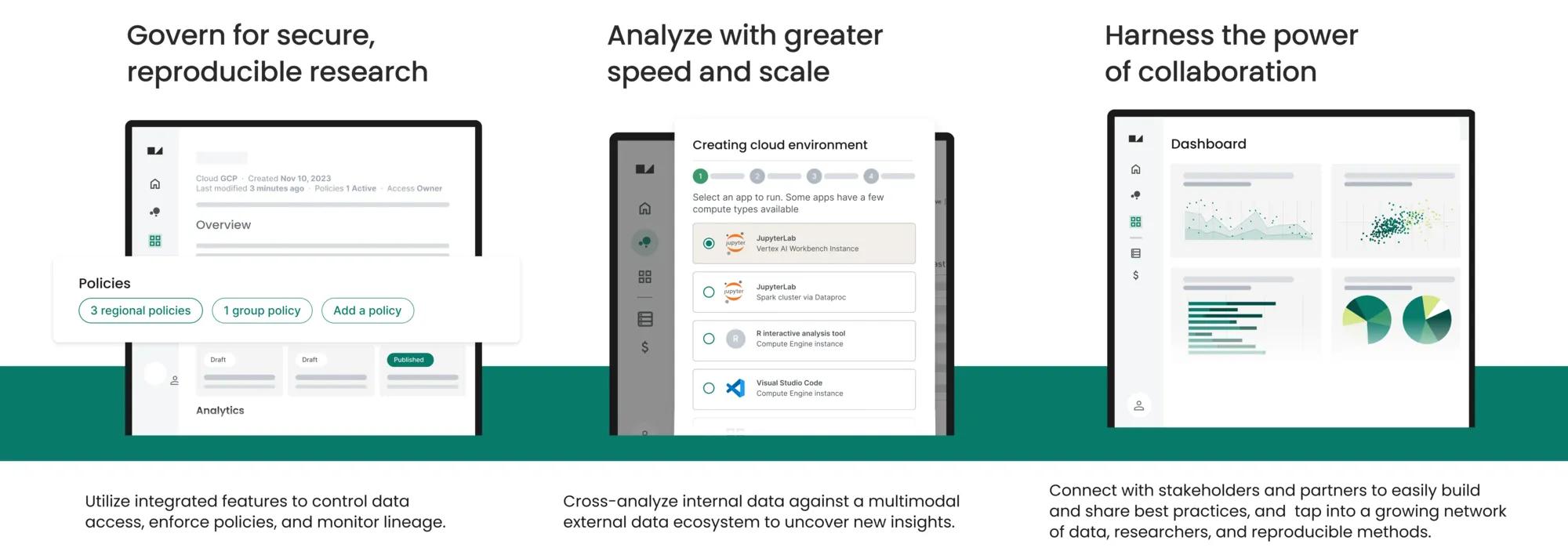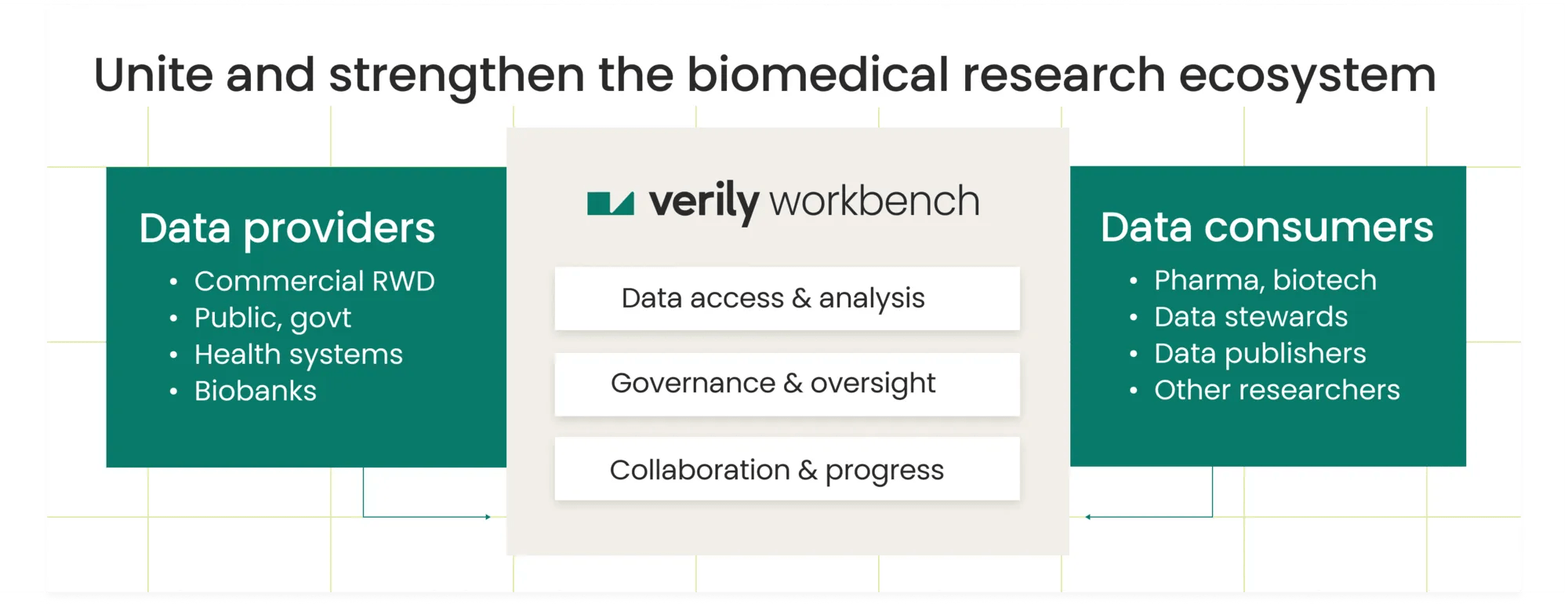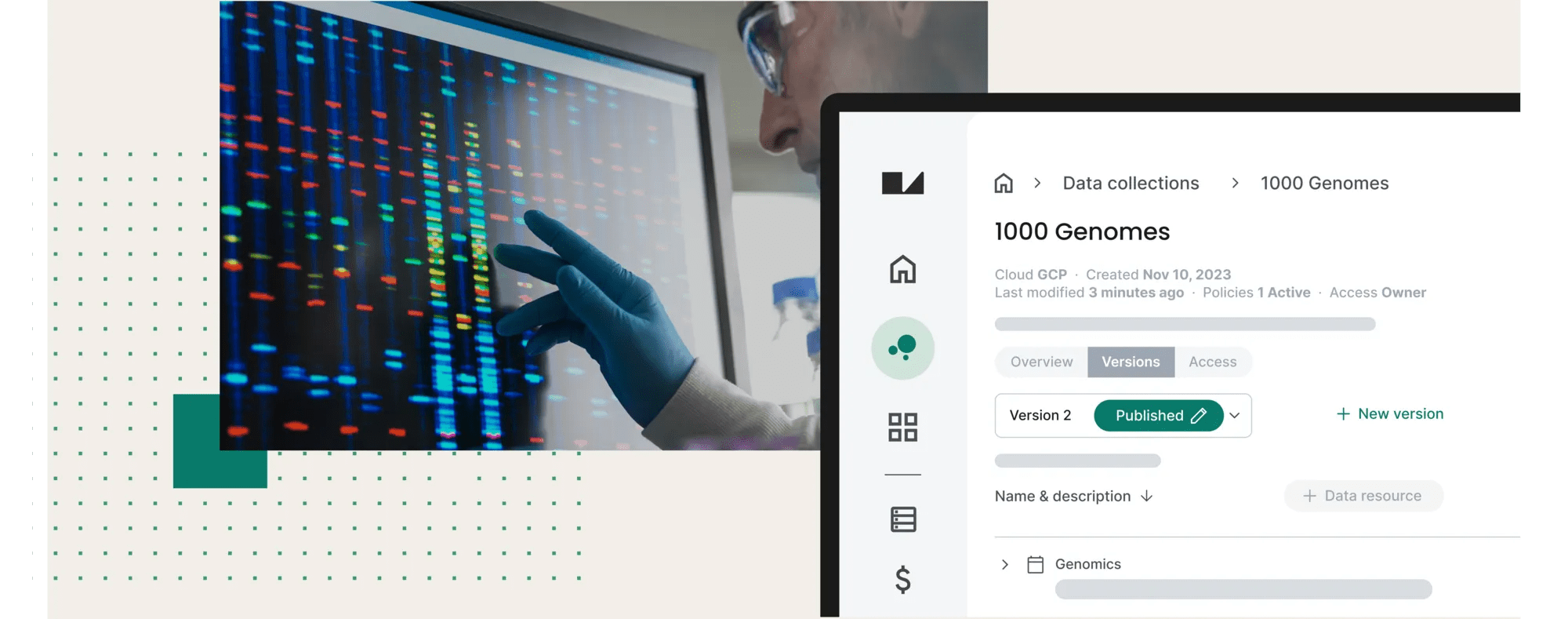Breaking down barriers to advance biomedical research
With advances in DNA sequencing, multiomics, wearables, imaging, and clinical data capture, there are more data modalities to draw from for biomedical research than ever before. These diverse datasets are the foundational building blocks of research. Alone, they are only a glimpse into our understanding of human biology and disease. Data harmonization and analysis are needed to help identify more novel drug targets and evidence that reveal the next breakthroughs.
Multimodal data also fuel AI/ML methods for faster development of new therapies. According to the Nature journal article, AI in small-molecule drug discovery: a coming wave?, biotech companies using AI-driven approaches to drug discovery have more than 150 small-molecule drugs in the pipeline, and more than 15 in clinical trials.1 This AI-powered pipeline is expanding at an annual rate of almost 40%.1
To fully realize data potential, it has to be FAIR — findable, accessible, interoperable, and reusable. But multimodal health data are often highly disorganized and siloed, and has disparate sources, formats, terminologies and usage rights. Also, the speed at which data are generated far outpaces researchers’ ability to utilize it. Existing technologies are unfit to help organizations unlock the promise of data, broaden its reach, and foster necessary, cross-industry partnerships to push scientific progress for breakthroughs.
With expanding data pools, genomics research is plagued with similar data access and use challenges as other biomedical data types, such as technical challenges in scaling analysis, lack of standardization, privacy and security concerns, data silos, format incompatibility, and need for data aggregation and harmonization. These barriers limit genomic data use and surface inequities, creating more urgency for answers to genomic and other health data processing and sharing questions in order to support research and development of critical precision medicines and therapies.
Without scientific and medical communities working together with the right tools and infrastructure to store, manage, harmonize, analyze, and share all health data in scalable, federated ways, data use in advancing biomedical research and development is limited. This ultimately costs time and money, and negatively impacts patient care and health outcomes.
Verily’s recent whitepaper, "Transforming Healthcare with Data," delves into this very challenge. It's not just about the sheer volume of data; it's about the complexities of accessing, analyzing, and sharing it responsibly.
Data silos are one of the most significant pharma R&D challenges.²
The power of more unified data sets for biomedical research
Through enterprise-wide infrastructure, biomedical data and analytics tools enable more seamless and secure research workflows with features to ingest, process, validate, curate, store, govern, and share data.
Data analysis tools and workspaces can provide a “space” to build stronger communities for more effective, cross-functional collaboration regardless of company or location. They can foster industry and academic partnerships, utilize reproducible research, and ensure research integrity through data governance platforms. In addition, they can enable a greater meeting of more minds by helping researchers across all disciplines and experience levels — from computational biologists, bioinformaticians, and principal investigators to data scientists, data stewards, and more — speak the same “language” with fit-for-purpose tools, such as pre-configured biomedical data analysis and data visualization tools.
The data analysis workspace can also enable large-scale medical research initiatives through multimodal data integration, modeling, and linking of fragmented sources, as well as helping manage the data lifecycle through comprehensive research management plans. For example, the National Institutes of Health (NIH) All Of Us Research Program is building a unique dataset, supported by the Researcher Workbench, an application developed in collaboration with Verily. Built as a trusted research environment, the Researcher Workbench is a secure, cloud-based platform where registered researchers across the globe can access and analyze a wide range of datasets for progressing precision medicine through greater understanding of the human genome and biological basis of disease.
Cloud technology is also revolutionizing the international biomedical data analysis workspace, offering security, scalability, and partnership opportunities. For example, UK Biobank’s cloud-based Research Analysis Platform democratizes access to health information, contributing to today’s rich and expanding data landscape by offering a large-scale biomedical database and research resource containing de-identified genetic, lifestyle and health information, and biological samples from a vast number of United Kingdom participants for worldwide researcher access and use.

Verily is committed to helping our customers make complex biomedical data more accessible, discoverable, and easier to analyze in order to accelerate research and improve care. Through the Verily platform, and our Workbench solution, we are providing the scalable infrastructure needed for customers to effectively store, share, and analyze data in a safe and secure way, while expanding the use of these data by the research community.
Myoung Cha, Verily’s Chief Product Officer
A scalable research environment to overcome biomedical data analysis barriers
Built on the foundation of Alphabet’s leading technology and data capabilities, Workbench is powered by the Verily platform, which securely organizes complex health data and provides the tools to enable users to safely and easily collaborate and analyze unified data sets to advance research and discovery.
Workbench supports easier, more efficient, and more secure research for biomedical data analysis by enabling collaborative analysis of data from many sources, organizations, and geographies, while more easily adhering to regulatory and ethical policies with an integrated data governance platform. To accomplish all this, the data analysis workspace is built with intuitive tools and safeguards for controlling the end-to-end data lifecycle, conducting reproducible research, and working together securely within, and across, research organizations with the full power of cloud computing in biomedical research.

A trusted research environment in action for healthcare
Along with the All of Us Research Program , UK Biobank, and Nashbio, other healthcare leaders are looking to help transform research via a data analysis workspace. For example, Workbench is supporting research for Parkinson’s disease, and amyotrophic lateral sclerosis (ALS) — The Michael J. Fox Foundation (MJFF), Target ALS, and Helix, respectively.
Helix, a population genomics and viral surveillance company, utilizes Workbench as a collaborative genomic data processing and analysis environment for their health systems partners and commercial customers.
Workbench has added new features and functionality that make it easier to manage, access, and conduct data analysis. Workbench now offers a broader suite of analysis, coding, and workflow tools, such as Visual Studio, JupyterLab with Spark clusters, and WDL workflows, in addition to existing tools such as R, Git, and BigQuery. New governance capabilities allow users to enforce Workspace policies on a wider range of cloud APIs, including Vertex AI and Dataflow.
Watch and Learn How to Analyze Data Sets in Verily Workbench →

Let’s do more together
Key challenges for biomedical researchers include obtaining harmonized and complete data, enhancing data analytics and compliance capabilities, and fostering effective partnerships, all necessary to advance medicine. Trusted research environments can tend to these needs. This includes Verily Workbench, which helps catalyze research and development for pharma and biotech by providing the collaborative research tools and infrastructure to modernize and simplify data analytics with an integrated data governance platform. Workbench also connects data generators and providers to data consumers, such as pharma and biotech customers, to help expand their biomedical data reach and purpose, while helping answer the need in biomedical and genomics data processing, access, and sharing.
Through greater industry partnerships, Workbench users can also help strengthen the overall health data ecosystem and connect scientific communities for uncovering medical breakthroughs, realizing the promise of precision medicine, and ultimately, bringing vital therapies to individuals who need them.
Sources
- Jayatunga MKP, Xie W, Ruder L, Schulze U, Meier C. AI in small-molecule drug discovery: a coming wave? Nat Rev Drug Discov. 2022 Mar;21(3):175-176. doi: 10.1038/d41573-022-00025-1. PMID: 35132242.
- Data silos threaten efficiency levels for nearly half of pharma businesses. European Pharmaceutical Manufacturer website. https://pharmaceuticalmanufacturer.media/pharma-manufacturing-news/latest-pharmaceutical-manufacturing-news/data-silos-threaten-efficiency-levels-for-nearly-half-of-pha/. Updated February 13, 2023. Accessed July 26, 2024.




